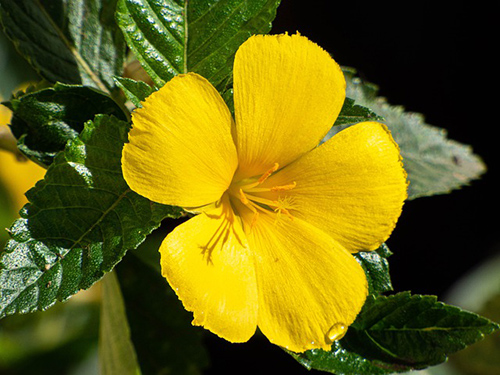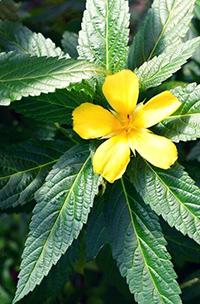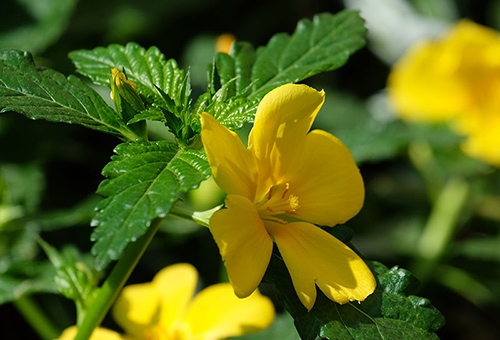Contents
The leaves of the damiana plant, which have a pleasant aromatic flavor, were used in Mexico as a substitute for tea and enjoyed deserved fame as an aphrodisiac.

Damiana Plant Scientific Facts
- Scientific name: Tumera diffusa Willd.
- Other names: Mexican damiana.
- French: The bourrique.
- Spanish: Damiana.
- Environment: It grows in Mexico, Central American countries, and the southern United States, but not Europe.
- Description: This shrub of the Turneraceae family grows up to two meters high. Its small, toothed leaves are lighter in color on their undersides, and small, yellow flowers grow in the plant’s upper leaf axils.
- Parts of the plant used medicinally: The leaves.
Healing Properties and Indications

The leaves contain an essential oil (rich in cineole, cymol, and pinene), a glycoside: arbutin, a bitter component, tannin, and resin. Its medicinal properties do not depend primarily on the substances mentioned above but result from their mixture. The properties of damiana are as follows:
- Nervous invigorator. The use of damiana renders good results for treating asthenia, weakness, physical or intellectual exhaustion, and stress. Unlike other stimulant products, damiana has a mild action that does not lead to addiction.
- Genitalia stimulant. Damiana has been proven to increase the number and vitality of spermatozoids. In women, it regularizes menstrual cycles and stimulates ovary functions. It has revitalizing and aphrodisiac properties for both sexes, which, unlike other sexual stimulants, does not have any known side effects. It is recommended for male impotence, premature ejaculation, and spermatorrhea (involuntary emission of semen).
- Mild diuretic.

How to use Damiana
- Infusion with 60-90 g of leaves per liter of water. Drink two or three cups daily.
- Extracts. These extracts are presented as diverse pharmaceutical preparations.
DISCLAIMER: All content on this website is presented solely for educational and informational objectives. Do not rely on the information provided as a replacement for advice, diagnosis, or treatment from a qualified medical expert. If you are pregnant, nursing, or have any preexisting medical concerns, talk to your doctor before using any herbal or natural medicines.
REFERENCES
- George D. Pamplona-Roger, M.D. “Encyclopedia of Medicinal Plants.” George D. Pamplona-Roger, M.D. Encyclopedia of Medicinal Plants. Ed. Francesc X. Gelabert. vols. 2 San Fernando de Henares: Editorial Safeliz, 2000. 613. Print.[Damiana plant]
- https://www.webmd.com/vitamins/ai/ingredientmono-703/damiana
- https://www.rxlist.com/supplements/damiana.htm
